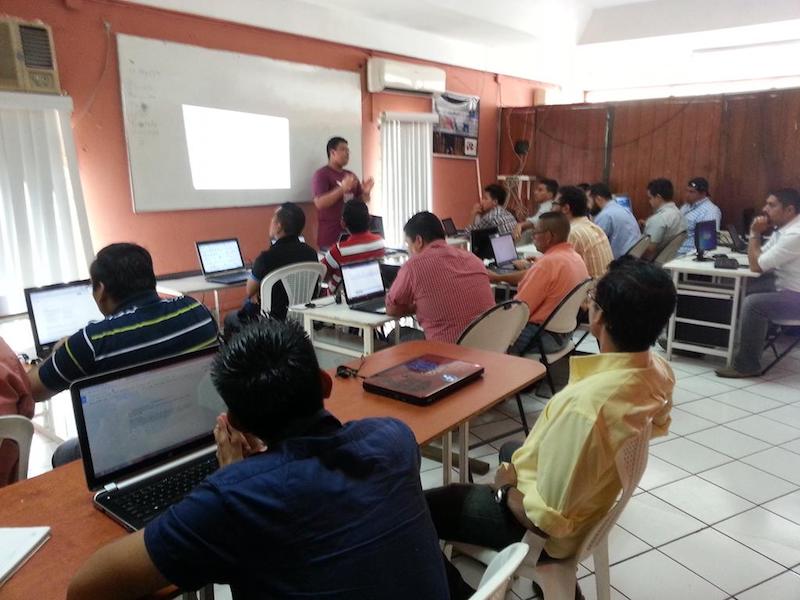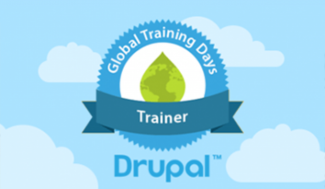The Global Training Days is an initiative coordinated by the Drupal Association to introduce new people to the wonderful world of Drupal. The initiative is about providing free or low-cost training to facilitate people gaining familiarity with Drupal in just a day. Depending on the format, attendees can leave the workshop with a website already built. In this blog post, I will explain how to organize one and share experiences and lessons learned after organizing them in Nicaragua since 2014. It is my hope to inspire you to be part of the initiative and organize a workshop in your local community.

The basics
To get started, find out the next dates when the workshops would be given worldwide. They happen two days in a row (on Friday and Saturday) approximately every 3 months. Dates are set in the last quarter of the previous year and can be checked at https://www.drupal.org/global-training-days.
For the workshop itself there are two options to choose from in terms of time and curriculum. The first is a What is Drupal? half-day workshop where attendees learn the basics of Drupal. If you go this route it is recommended to spend most of the time explaining the different Drupal concepts, and how they relate to each other in order to build a site. Hands-on instructions where each attendee builds a site can be left out due to time constraints, but it is fine to have a demo where you show how to assemble a website using Drupal.
The second option is an Intro to Drupal full-day workshop where attendees learn the basic concepts and have the opportunity to build a simple yet functional Drupal site. For this type of workshop, you can spend the first half explaining concepts and the second half building the site. Remember the introductory nature of the workshop. Do not try to cover advanced site building concepts. Stick to Drupal core and build your site using using nodes, blocks, views, and core modules like Contact. In either version of the workshop, do not go over how to build themes or modules. If you try to cover too many topics, you might not develop them all appropriately. If you really want to cover these topics, it is better to organize a follow up workshop where they could be explained with more time.
Once you decide the date and type of workshop you want to present, sign up at this page. After doing so you will get an email from the Drupal Association. You will also be added to the list of organizers.
Plan ahead
The dates for the workshops are announced way ahead of time. Be an early bird and do not leave things to the last minute. Ask yourself these questions and plan accordingly:
- Am I participating the two days (Friday and Saturday) or only one day?
- Am I presenting a half-day or a full-day workshop?
- Am I providing computers to attendees or they are required to bring a laptop?
- Am I providing lunch for attendees or they are required to bring/buy their own food?
- How many people can attend based on the facility’s capacity?
- How many people can attend based on the number of speakers?
- Does each speaker know which section of the workshop they are going to present?
- If the workshop includes building a Drupal site, which tools will I use?
- Where should I advertise the workshop?
- What is the contingency plan in case the Internet service does not work?
Before the training
It may seem obvious, but make sure you have a place with the proper conditions to give a workshop. You will need:
- a projector
- a whiteboard or chalkboard, or flipchart and markers
- a decent Internet connection
- good room lighting
- comfortable room temperature
- zero sound pollution
The last item is very important as you do not want to yell to be heard. It happened to us once that the room next to the workshop laboratory was occupied by a group of loud children. This not only distracted the attendees, but also forced me to raise my voice to be heard. After speaking loudly for a couple of hours my voice had disappeared.
Even without noise pollution, giving back-to-back trainings two days in a row poses quite a challenge to keeping your voice audible. Make sure you have multiple speakers and take turns presenting. Use a microphone if available. It helps to preserve your voice, and helps participants who might not hear very well.
Once you have the venue figured out, be realistic about how many people you can effectively manage. Organizing a workshop takes lots of effort. It is fine to try to teach as many people as possible, but quality is preferred over quantity. In our experience, teaching small groups is more effective because you can dedicate more time to answer all questions each attendee might have and provide a personalized learning experience.
Make sure you get a confirmation of the venue at least 3 weeks before the training so you have time to promote the workshop. In Nicaragua, we always make the announcement in our official Drupal group and on the community’s Twitter and Facebook accounts. But experience has shown us that only a minority of the attendees find out about the event through these channels. In our case, about 90% of attendees discovered the event after seeing an invitation posted to a non-Drupal specific Facebook group of Nicaraguan developers. The 10% remaining is a combination of word of mouth (past participants recommending the workshop to others), people I meet in various tech meetups, and the channels mentioned before.
When deciding where to advertise the workshop, find the right pond and remember to fish where the fish are. If you have some spare dollars, feel free to invest in paid social media advertisement. No matter where you decide to promote the workshop, include the following information in the announcement:
- Date and times.
- Name of venue and address.
- A photo of the building where the workshop will take place! We have experienced people being unable to find the venue. So, play it safe, be verbose with directions, and add a photo of the venue.
- Whether or not it is required to bring a laptop.
- Whether or not lunch will be provided.
- If registration is required, the url where people can register.
- A note that no previous knowledge is required and that anyone (not only tech people) can join! :-D
Prepare the tools you will use in the training. In Nicaragua, we prefer to use Patrick Drotleff‘s amazing service https://simplytest.me This allows us to focus on building the Drupal site, instead of configuring the myriad of local environments that attendees may have. In our experience, configuring local environments on each attendee’s computer takes too much time. For example, most of the participants that come to our workshops use Windows. Trying to set up a LAMP environment could be surprisingly complicated in this operating system. Even out of the box solutions like XAMPP might not be able to start the web server due to port conflicts. Skype is a recurrent culprit. Starting a MySQL server might also fail. If that happens, skip it altogether and install using SQLite. More often than not, we go the fastest route and use disposable Drupal installations. Keep in mind that you are teaching Drupal site building, not server configuration.
"Anything that can go wrong, will go wrong."
Murphy’s law will manifest more often than you would like. Be prepared and have a contingency plan for as much as you can. During one of our workshops, our favorite tool https://simplytest.me was down, but we were prepared with packages for local installation. In another instance, the venue was changing Internet provider and we had no Internet at all. Again, local installations came to the rescue. In such cases, save time by asking people to work in pairs or small groups so you do not have to configure a lot of computers. Bring a copy of your slide deck in a thumb drive so you can present offline in case it is needed. In Nicaragua, not only the tech is community vibrant. Volcanoes are too! With a handful of active volcanoes that produce tremors very often, we need to make sure to have clear instructions on how to leave the facility if necessary. Do your homework and be ready in case anything goes wrong.
On the day of the training
Take with you a laptop, a VGA/DVI/HDMI cable and adapter, and a back up projector if available. Have a copy of your slide deck for offline presenting and all the tools you might need in case the Internet decides to visit Saturn. Arrive early at the venue, set up your computer and projector for the presentation, and write the wi-fi password on the board. If you are providing computers, make sure any tool you intend to use is installed and working.
Take lots of photos (with participants' permission) and share them on social media. Be sure to record the training for posterity. This is not to show off, but to inspire others to organize workshops in their local communities. Make sure to use the official #DrupalGTD hashtag when sharing content. And please respect those who might not want to appear online! In our trainings, after finishing presenting theory and before starting to build sites we ask the attendees for a group photo which we later share on Facebook and Twitter.
We drupalers are fond of freebies. We enjoy stickers, T-shirts, trial online subscriptions, or anything that comes in an event as swag, right? Let’s share this passion with attendees. In our trainings, we use to have a table with lots of stickers for people to take from. In one occasion we also gave away T-shirts. And we have gotten in contact with online education providers to give attendees free trial access to their content. Chris Shattuck from Build a Module has been so kind in offering free access to his amazing library of content for 8 days to every attendee of our workshops. He also gave us some 1-month free memberships to raffle off. And the friendly folks from Knp University provided free access to Drupal-related material to attendees of the November 2015 edition of the workshop. When organizing a workshop make sure to have some treats for your attendees and partner with education providers so they can keep learning when the day is over. Also, show attendees how to stay connected with the broader community by helping them create a drupal.org profile and teaching them how to get involved.
A final comment for this section has to do with attendance. Do not feel bad if the number of people who show up is not the same that the number of people who registered. In fact, almost every time those numbers will not match. Sometimes you will have many attendees and in other occasions only a few. Do not let this disappoint you. Remember what motivated you in the first place to organize the event. Share your knowledge with others, no matter the number of attendees. Personally, I would present any workshop or session as long as at least one person shows up. Everyone’s time is valuable and each attendee sets aside time to listen to you. That is an honor I take with great responsibility, and you should too.
After the training
After you have enjoyed the Global Training Days experience, give thanks to everyone who made the workshop possible. This includes the attendees, co-presenters, venue providers, sponsors, and educational partners. In Nicaragua we post pictures and thank-you notes on Twitter and Facebook. And in those thank-you messages we also include the next dates of the workshop for those who missed it this time.
Of utmost importance is to perform an evaluation of the workshop. Meditate on things that went well, but also on things that went wrong and can be improved. At the end of our workshops we ask for feedback from the attendees. We also take time to improve the slide deck based on the concepts that attendees had difficulty understanding. This often translates to changing the copy, images, and examples used to explain the different concepts.
After all the hard work, give yourself a pat on the back, and share your story with others. You can write a blog post like this or simply post pictures of the workshop online. The Drupal Association is also interested in feedback from you and the attendees, so do not hesitate in providing it.
My wish list
The Drupal Association provides a lot of support and material to promote these events. Unfortunately, this content is only available in English at the moment. I would love to see this content translated to every language spoken by a member of our community. In Spanish for example, there is a great community that could help with the task of translating the content. The same can be said for communities which speak other languages. Eduardo Garcia is running for Director at Large within the Drupal Association and he has interesting ideas about making our community more inclusive for non-English speaking members.
Another wish of mine is collaboration in curriculum building. When the Nicaraguan community started to participate in the Global Trainings Days initiative back in 2014, we found little content that could be used in the workshop. The Drupal Association offers a curriculum in case you need it, but it is in English and our audience speaks Spanish. Because of this, we basically had to start creating a curriculum from scratch. The curriculum we use in Nicaragua is far from perfect, but the content has improved a lot over time. This has taken a lot of time and effort, yet there is no need to repeat the process again. Because of this, we have made our content available under a Creative Commons Attribution - Non Commercial - Share Alike license for anyone to use and adapt to their needs. So far we have available both a slide deck and a video recording of the theory part of one of the workshops. Unfortunately, some videos do not have audio, but we are planning on making another recording in a future edition. Also, I have started working on a written version of the workshop. This document is in a very early stage, but I will continue adding to it as time permits. It would be great if other communities would use this documentation and provide feedback to improve it. Collaborating in building a curriculum in different languages would be amazing. If you like this idea, start working on the curriculum in a new language and promote it to get feedback from others.
Measuring success
There are various parameters that you could use to measure the success of your workshops. For example, the number of attendees and the number of people who keep engaged with the local community thereafter. In Nicaragua, we have organized 10 workshops since 2014 and over 120 people have attended. Some keep engaged, while others do not. But numbers can be cold, so we measure success in non-quantitative ways. For example, seeing people smile when they understand the basic concepts of Drupal, or viewing their excitement after being able to build a website during the training.
Sometimes, we are able to make a more significant impact on the life of attendees. For instance, we are aware of people who could land a Drupal job after attending the workshop and continuing to learn on their own. The fact that we are making an impact on their lives is our best reward. Here are two testimonials of people who got a job after attending our workshops.
Ada Hernández - Translation and code contributor:
Hello everyone. My name is Ada Hernández Acosta and I am from León, Nicaragua. Attending a Drupal workshop presented by Lucas Hedding and Mauricio Dinarte set a milestone in my professional and personal life. At the workshop I learned the basic of Drupal: nodes, taxonomies, views, modules, themes, and more. I also learned the benefits of using Drupal including its security and no cost for usage. Moreover, a worldwide community is actively working on creating new modules, themes, and security updates. After attending the workshop I developed a strong interest in Drupal and decided let Drupal take part in my life. Today I work at MTech, LLC building websites on Drupal. Now I am also a member of this great community and I am able to make contributions to modules I use on the sites I work on. Thank you very much.
Edys Meza - Code contributor:
It was my first experience in something of this nature. I had just finished college and I wanted to learn new technologies. The Global Training Days workshop was a great opportunity for this. After attending the workshop I got an overview of Drupal that helped me a lot in the future. I learned basic concepts (nodes, taxonomies, users, blocks, etc.) each with real life examples; this was intuitive and easy to understand. That day I became part of the great Drupal community. Attending the workshop changed my life. After it I kept learning in the free classes presented by MTech, LLC where I currently work and continue learning everyday. I think these workshops are what make the Drupal community grow and help improve the lives of attendees.
Final comments
Be flexible. Nothing related to the Global Training Day is set in stone. For example, if for any reason you cannot give the training on the day suggested by the Drupal Association, pick another day. It can be in the same week or the week before or after. A good reason to do this is to let yourself rest and have enough time to recover your voice between multiple workshops in the same edition of the initiative.
Community first, companies later. Although the Drupal Association primarily has invited companies to give workshops to promote themselves, growing the Drupal community and sharing your knowledge should be the focus. In Nicaragua, we started to give the training as a local community initiative. It was Drupal Nicaragua, not a company who started giving the workshop in 2014. Later, both Agaric and MTech sponsored the events and education providers partnered with us. Of course, we are very grateful to them for their ongoing support!
Keep calm and enjoy the experience. Undoubtedly there will be mistakes, particularly the first few times you organize the workshop. In Nicaragua, we have given 10 workshops so far and none has been perfect. What is important is that you learn from the mistakes and improve for the next edition. Sometimes we face many difficulties, but we are able to work through them. At the end of the workshop, you will be rewarded by the smiles of people who have learned to build a simple yet functional website in a matter of hours. :-D
This is how the Nicaraguan Drupal community organizes Global Training Days. It is my hope that after reading through you feel inspired to give a training in your local community. When you are ready to take the challenge, pour your heart into it. Upload some photos of the workshop once it is finished, and share your experience, so that the entire Drupal community can benefit from it. If you have already participated in the Global Training Days, please share your story in the comments below. Have fun!
Special thanks to Alina Mackenzie and Lizz Trudeau for their thorough reviews and suggestions to this blog post. Also to Lucas Hedding who has helped move the Nicaraguan Drupal community forward by creating documentation and organizing events. His contributions to the local community are invaluable. And thanks to the amazing BADCamp organizers for providing me financial support to attend the camp the last two years. I have learned a lot during these events and the acquired knowledge has greatly improved the curriculum used at the Global Training Days workshop. The effort that you pour into the camp and keeping it free is inspiring and greatly appreciated. Keep up the good work! :-)





Comments
Add new comment